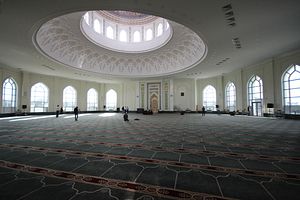Islam has a special role in Uzbekistan. Historically, people in what is now Uzbekistan identified themselves as Muslims before they identified themselves as representatives of any particular nation. Edward Allworth in his Modern Uzbeks (1990) writes that Islam guided the lives of Uzbeks and served as ethnic and cultural identity throughout history for Uzbeks until the Russians came in the 1900s. Besides, Allworth adds, Islam served as a spiritual force that maintained the ethnic unity of Uzbeks. This centrality of Islam in Uzbek history leads one to conclude that secular Uzbekistan is nothing more than an accident rather than the norm.
This greater role of Islam in Uzbek society was increasingly suppressed following the independence of Uzbekistan in 1991 due to the threat it posed to the status quo. But when President Shavkat Mirziyoyev came to power in 2016, not only did the new administration embrace the country’s Muslim heritage, but made efforts which seemed to encourage greater religious freedom. It started with allowing mosques to use loudspeakers for the call to prayer, then came the removal of 16,000 individuals from security blacklists of potential religious extremists. The government sponsored multi-stage Quranic recitation competitions among men and women followed by Hadith competitions. The new government earnestly proliferated new religious education facilities and new mosques to meet population demands.
Then in August came a governmental regulation on school uniforms that explicitly banned any religious clothing and accessories among students. Some individuals took to social media to express their discontent about the law, reasoning it amounted to discrimination against conservative Muslims. These open discussions made the government nervous.
As often in the past, the government overreacted and arrested some of the most vocal social media users, violating the very civility and respect to the population that the new administration was attempting to instill among public servants. The government went further and pressured female students in the International Islamic Academy created by Mirziyoyev’s decree to abandon their headscarves or face expulsion. Furthermore, a government appointed imam was sacked for speaking out against these events.
The current administration has indisputably increased its tolerance for free speech. President Mirziyoyev himself does not shy away from scathing criticisms of the previous administration’s policies and individual officials. From the outset of his presidency Mirziyoyev ordered the establishment of a system to receive population complaints. Buoyed by this openness, naturally people have turned to social media both to celebrate these transformations and express their discontent. Uzbekistan’s Senator Sodiq Safoyev, one of Mirziyoyev’s top men, in an event held in Washington, DC dedicated to the ongoing reforms in Uzbekistan touted the active social media environment in Uzbekistan as a clear sign of changing Uzbekistan.
The challenges for the current Uzbek government are also clear: It is attempting to strike a balance between the country’s Muslim heritage and maintaining the secular status quo. The administration perhaps worries that conservative Islamic ideas could make way for destructive, and uncontrollable, forces and therefore seeks some means of control. However, at the same time, the government lacks a civilized means of explaining its position to conservatives without using force and threats.
The arrests, pressure on female religious students, and the sacking of the imam have brought a chilling effect to the image of the new Uzbekistan. These issues are more noticeable outside of Uzbekistan than inside Uzbekistan, and raised among some the question of whether Uzbekistan had reached the point of reversal of its reforms. This is a premature judgement, there are no signs that reforms will halt in their entirety. The wheel of economic reforms the country has put in motion, for example, can not keep moving forward without existing and additional reforms.
The government’s reaction to the social media discussions revealed the current administration’s tolerance level, realizing that the open discussions it allowed two year ago could upend its very existence. The government also revealed its fear of conservative Islam. Despite increased embrace of Uzbekistan’s Muslim heritage, the government seems to want to continue to balance that heritage with a degree of control.

































